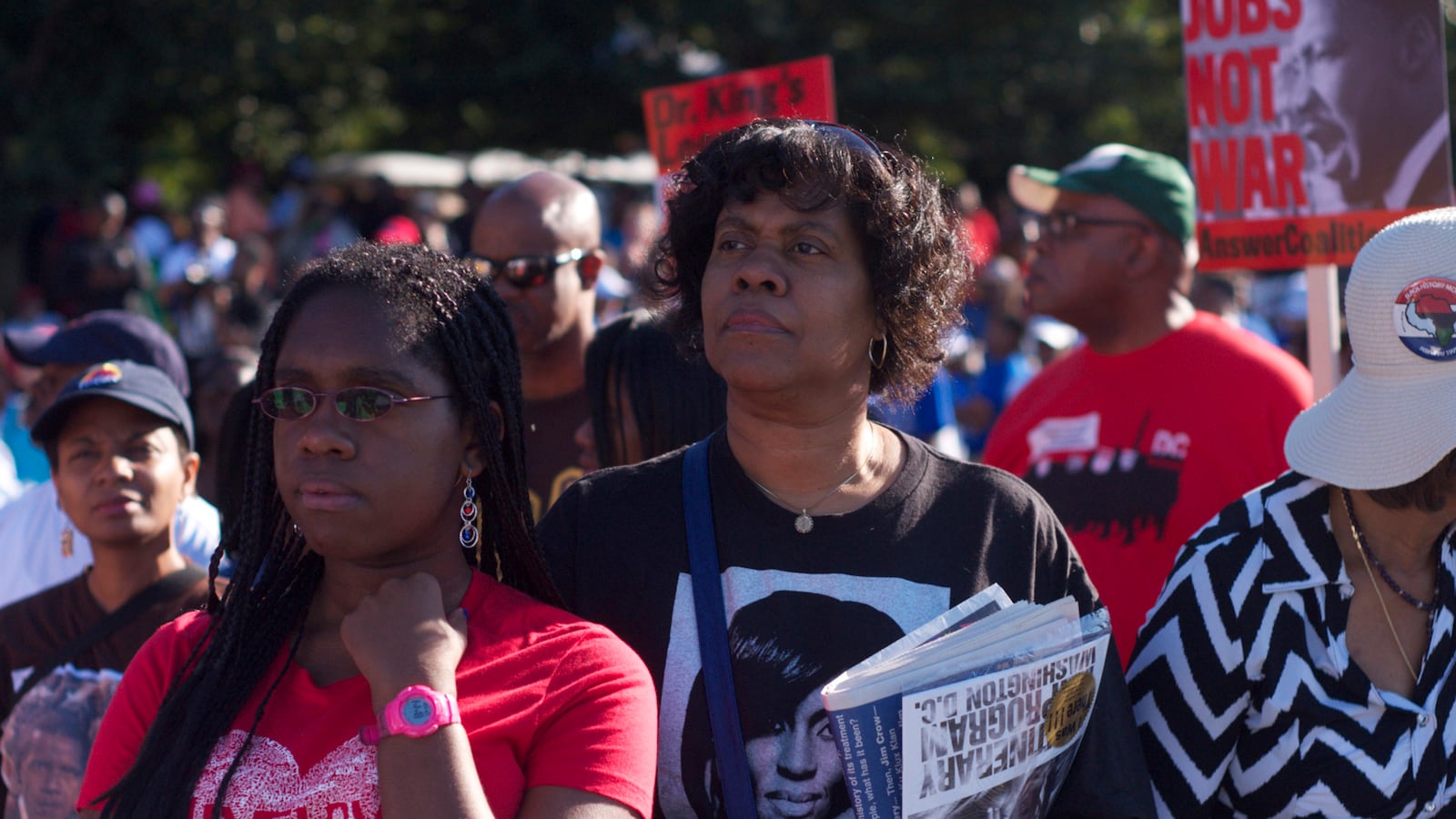Saturday’s March on Washington was a diverse, multigenerational cross-section of America, with people of every shape, size, and hue. But what stood out to me most were the signs.

“We demand equality for all!” said one, held by women from the League of United Latin American Citizens. “We march to end RACIAL PROFILING,” said several others, carried by groups of black college students. An older white woman shielded herself from the sun with a sign that asked observers to “Support Trayvon’s Law,” and a group of Filipino women stood on the outskirts of the Lincoln Memorial, in the middle of the crowd, with signs that read “STOP TRAFFICKING OUR PEOPLE!” and “Stop the Imperialist Exploitation of Women and Children!!!”
It’s not hard to imagine places in the United States where these signs are off-putting and as alienating as the “Don’t Tread on Me” signs that dot Tea Party protests. But that’s the point. The striking thing about the original March on Washington 50 years ago is how it wasn’t a moment of interracial unity—at least, not in the way it’s portrayed today. Rather, the 1963 March for Jobs and Freedom was militant, a demand for equal treatment under the law and direct investment in the long-neglected fields of black America. It wasn’t a popular agenda. That January, George Wallace was inaugurated governor of Alabama and declared: “Segregation now, segregation tomorrow, and segregation forever.” That June, Medgar Evers, field secretary for the NAACP, was assassinated in Mississippi while coming home from a meeting with lawyers. And that September, in retaliation for the march, four little girls would be killed after their church was bombed in Birmingham.
The only way to commemorate this legacy is with demands for justice and equality, and to its credit, Saturday’s event had speakers who did just that, including Julian Bond and Rev. Lennox Yearwood, president and CEO of the Hip Hop Caucus. “People here can meet, discuss, brainstorm, and further our social justice ambitions,” said DeAnna Murphy, a community organizer from St. Louis, Mo., who kept a small American flag flying from her bag for the occasion. Others, like a group of young activists, asserted the personhood of undocumented immigrants with a bullhorn and a chant. “Immigrant rights are here to stay,” they said.
At the same time, however, the 50th anniversary commemoration featured long speeches from such mainstream political figures as Attorney General Eric Holder and Newark Mayor Cory Booker. And while they were popular with the crowd, it’s hard to see how they were relevant. You could even say their presence was a mistake.

Yes, Booker gave a rousing speech. “The truth of the matter is, the dream still demands, the moral conscience of our country still calls us, that hope still needs heroes,” he said. But how does one square his platitude with the reality of his situation? After all, Booker is the Wall Street-friendly Democrat who criticized the Obama campaign last year for attacking private equity funds. How does Booker reconcile his views with the Martin Luther King Jr. who wrote in 1963’s Strength to Love: “The profit motive, when it is the sole basis of an economic system, encourages a cutthroat competition and selfish ambition that inspires men to be more concerned about making a living than making a life.”
The same goes for Holder, who in some sense embodies King’s dream—an America where the racial barriers to outstanding achievement have been lowered—but at the same time represents a status quo of mass incarceration that King would have stood against.
Worse yet, comparatively little time was given to our new generation of civil rights leaders. Rev. William Barber is president of the North Carolina NAACP and leader of the state’s Moral Monday movement. Through organizing and activism, he has created a multiracial political movement that draws thousands of people every week. It’s the kind of mass activism pioneered by the organizers of the civil rights movement. But compared to Booker and Holder, Barber was allotted just moments to speak. The same was true for the dozens of speakers who stood against income inequality, racism, and discrimination based on sexual orientation and gender.
With all this in mind, it’s almost a good thing Barack Obama was absent from the event. The president of the United States is, by definition, a compromised figure. Circumstances close him off to the substantive King, the figure who a month after the 1963 march declared unemployment “a form of brutality, especially for those who live on the edge of poverty,” and who demanded government action to level the “obstacles of discrimination” and create “new jobs by public works.” Would the King who called for “nonviolence in all areas of human conflict” and “nonviolence on an international scale” have any sympathy for the president who pioneered “targeted” killings and drone strikes? And more important, would the public have any sympathy for this King?
In the 10 years of his greatest productivity as a leader and thinker, Martin Luther King Jr. called for guaranteed minimum incomes, affirmative action, disarmament, and a “Marshall Plan” for African-Americans. In short, reparations. He lambasted establishment leaders and showed sympathy to the Vietnamese communists. He was unpopular; in August 1966, a whopping 63 percent of Americans held an unfavorable view of the civil rights leader. Of those, nearly 70 percent held a highly unfavorable view.
The only Martin Luther King Jr. that President Obama—or most Americans—can celebrate and commemorate in a full-hearted way is one who’s been mythologized and shorn of his rough edges. That’s the one we have. Do we want that King? Or do we want to reclaim his radical legacy and at the same time sacrifice his popularity?
Given the inequality and the injustice that continues to plague our society, the second option is tempting.






